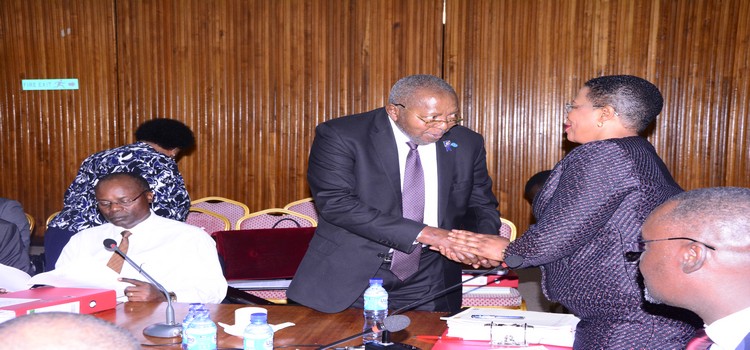MPs demand assets inventory of defunct Teffe Bank

Members of Parliament have tasked Bank of Uganda (BoU) to provide an assets inventory of the defunct Teffe Trust Bank.
Teffe Trust Bank was closed in 1993 over insider lending and accumulation of bad debt to the point that it could not effectively operate. Other banks closed for similar reasons in the 1990’s included, Greenland Bank, Sembule Bank and ICB.
On 30th January, 2018, and 10th April, 2018, the Auditor General requested documentation relating to all closed banks, specifically the inventory reports, loan schedules, customer deposit schedules, statement of affairs and any reports supporting assets and liabilities taken over by BOU.
Two weeks ago, BoU officials started appearing before the Parliamentary Committee on Commissions, Statutory Authorities and State Enterprises (COSASE) to respond to the Auditor General’s report.
BoU officials led by Governor Emmanuel Tumusiime-Mutebile who met COSASE on Monday, 12 November, 2018 however said that their search for an inventory report for Teffe Bank has not yielded any results, while the loan schedules and deposit schedules are confidential.
The Executive Director Supervision, BoU, Dr. Tumubweine Twinemanzi said that he was not availed with sufficient documentation relating to Teffe Trust Bank to enable him fulfil the specific audit objectives.
“Bank of Uganda management explained to the Auditor that it will continue to search in the archives to get all the information. In our search, we have been unable to find any kind of inventory report,” said Tumubweine.
The Deputy Governor BoU, Louis Kasekende explained that the law that was used to close Teffe Bank did not provide for an inventory.
“At the time of the closure of Teffe, it was the 1969 law and the nature of documents required at that time, did not include an inventory, so we do not have an inventory at the moment,” said Kasekende.
The legislators however said that proceeding without an inventory would not yield any results.
Hon. Joseph Ssewungu (DP, Kalungu West) said that BoU has the documents and they only need to be compelled to produce them.
“In many sittings with accountability committees, these people deny Auditors documents. But sometimes they later bring them. The reason they gave the Auditors for closing Teffe bank was insolvency, and that came from their documents,” said Ssewungu.
Hon. Moses Kasibante (INDP. Rubaga North) said that a bank cannot be closed without documentation.
“There are two circumstances under which this report is missing, either it was misplaced, or never there. If it was never there, the Bank needs to explain why they closed a bank without documentation,” said Kasibante.
Hon. Francis Mwijukye (FDC, Buhweju) wondered if the Central Bank’s failure to produce the assets inventory was deliberate.
“In the absence of an inventory, one wonders whether Bank of Uganda knows what they took over,” said Mwijukye.
The Vice Chairperson COSASE, Hon. Anita Among (INDP. Bukedea district) said that records provided by BoU in their response to the committee indicate that there is an inventory.
“On the record I see that you made final accounts on this Bank and you have statements of accounts. In your reports, there are assets and liabilities, so how is it then possible that you don’t have an inventory,” wondered Among.
The Chairperson COSASE, Hon. Abdul Katuntu (FDC, Bugweri) said that whereas the law might not have provided for an inventory, it was prudent for BoU to make one.
“You cannot move in and take over an institution without acknowledging or documenting what you are taking over. Professional practice would require you to make an inventory,” said Katuntu.
Katuntu gave the Central Bank until 14 November, 2018 to provide the MPs with all the required documents and present them before the committee on 15 November, 2018.
Governor, Mutebile however urged the committee to be mindful of court cases which he said have implications of how much information the Bank can provide.
He explained that resolution of banks is a complex exercise and each bank being dissolved has its own unique circumstances.
“There are a number of challenges encountered during resolution and one of the challenges is litigation by shareholders. There have been several court cases and some of these are still unresolved,” said Mutebile.
He assured the committee that the Bank is making progress in concluding several bank resolutions.
